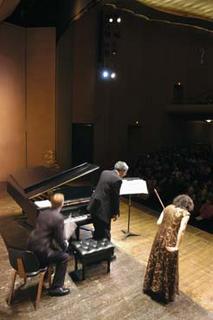 Washington Performing Arts Society is responsible for a large percentage of the best concerts in Washington most seasons. They bring big names and have an audience generally faithful and experienced enough so that those big names can present repertoire that consists of something besides crowd-pleasing chestnuts. That was certainly the case with the recital by one-name violinist Midori and pianist Charles Abramovic at Strathmore last night.
Washington Performing Arts Society is responsible for a large percentage of the best concerts in Washington most seasons. They bring big names and have an audience generally faithful and experienced enough so that those big names can present repertoire that consists of something besides crowd-pleasing chestnuts. That was certainly the case with the recital by one-name violinist Midori and pianist Charles Abramovic at Strathmore last night. The reason that I went to Strathmore, thereby sacrificing the Takács Quartet at the National Gallery of Art, was to hear Prokofiev's first violin sonata, op. 80 in F minor. It's a piece that she has not recorded, to my knowledge, and based on her excellent performance, I think she should. This piece had the best range of sounds and textures on the whole program, from the somber octaves in the piano's opening and the violin's cold melismas ("like the wind in the graveyard," the composer specified), presented in the first movement and then returning in the last as the sonata's dominant theme. It is one of Prokofiev's wartime works, begun in 1938 and completed after the war in 1946, when it was premiered by David Oistrakh in Moscow.
On Friday night, I had been moved to tears by the conclusion of the Jupiter Quartet's rendition of Britten's second quartet at the Corcoran (see Jens's review). That piece was from around the same time, and the Jupiter Quartet started playing it, they told me after the concert, because they were asked to contribute to a conference on the theme of music and pacifism. In that conclusion, the work's main theme -- a tragic and dissonant melody presented in unison, which seemed to me to represent the spirit of war -- was ultimately overwhelmed by a series of massive, heroic C major chords that ripped off cascades of bowhair. While Britten's response to the Second World War in that case was hopeful and resolved, Prokofiev's sonata gave me a sense of isolation, loneliness, and resigned depression, implying an admission of defeat in the face of a chilling lack of human warmth. It could become the theme song of someone living in Washington during the Bush administration.
Joan Reinthaler, A Delicate Balancing Act From Midori (Washington Post, October 25) |
If I had had to miss anything on the program, it would have been the Mozart selection, the A major sonata, K. 305. As luck would have it, that piece opened the concert. I missed most of it because I was trapped in horrible traffic on the Beltway, as the fans left the football game out in Landover. Schoenberg's odd Phantasy for Violin with Piano Accompaniment, op. 47, was from the same period as the Prokofiev, but it left me mostly cold. It also provoked an obnoxious early applauder (who started up the splitsecond the last note of the tone row sounded, to show that he knew the piece) and mostly lots of murmuring in the semi-full house. Midori's strong, wild, and rather personal reading of the Beethoven sonata was a musical thrill ride, supported ably by Mr. Abramovic, whose playing was always capable, deferential to the soloist, and sensitive, if not particularly memorable.
Upcoming concerts from WPAS that we advise you not to miss include mezzo-soprano Cecilia Bartoli (October 26), violinist Hilary Hahn (November 13), and pianist Mitsuko Uchida (November 15).
"Prokofiev's sonata gave me a sense of isolation, loneliness, and resigned depression, implying an admission of defeat in the face of a chilling lack of human warmth. It could become the theme song of someone living in Washington during the Bush administration."
ReplyDeleteHow I love to get my political indoctrination with a music review. Nevermind that linking the isolation of Prokofiev under Stalinist terror to living perfectly free and unmolested under a democratically elected regime in the US is a gross exaggeration and tastlessly benign towards the horror of living in a totalitarian state.
It was meant to be a joke. Lighten up.
ReplyDeleteAnonymous gives me a sense of isolation, loneliness, and resigned depression, implying an admission of defeat in the face of a chilling lack of human warmth. It could become the theme song of someone living in Washington during the Bush administration."
ReplyDeleteThe only thing worse than Mark's posts are his comments. Yawn.
ReplyDeleteIf the comment was a joke, it was a particularly unfunny one. I'll lighten up, though - no worries.